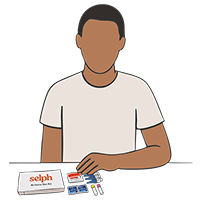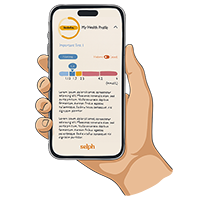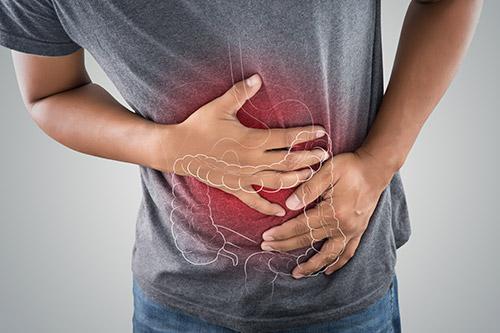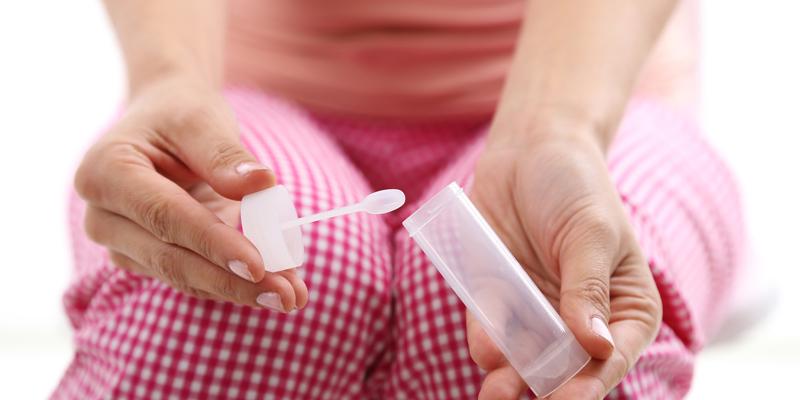Personalise your gut health test
Add to your test
2 add-ons availableChoose how to collect your sample
4 optionsFinger-prick blood collection
Total price:
£319.00
Includes our
Complete Gut Health Test & Symptom Screen
Are you experiencing gut symptoms? Our gut health test is a great place to start to understand what's happening with your gut health.
This comprehensive blood and stool test panel is designed to check for the main causes of gut symptoms from gut inflammation to gut bacteria infections. You'll receive a report explaining your results and any next steps.
What you need to know about our Complete Gut Health Test & Symptom Screen
Gut symptoms, such as diarrhoea, stomach pain and bloating, can really get in the way of living your life.
Our gut health test is based on guidelines from the British Society of Gastroenterology and includes blood and stool tests for all the main causes of gut symptoms in one go.
How the gut health test works

Do your gut health test
You'll get your kits next-working day.
Collect your blood and stool samples at home using the simple kits and return them to our UKAS-accredited lab using the pre-paid envelopes.

Get rapid gut health results
Once the lab have your samples, you'll get your gut health test results quickly.
A doctor will review your results and explain what your Complete Gut Health Test & Symptom Screen shows about possible causes and for gut symptoms.

Get support
If anything it picked up in your tests, we'll explain the next steps. You can also book an appointment with one of gut health expert doctors for more in-depth support (costs extra).
What's tested in the Complete Gut Health Test & Symptom Screen?
Our Complete Gut Health Test uses both blood and stool samples to look at 10 biomarkers checking for:
Gut Inflammation
Gut inflammation is a common cause of gut symptoms such as stomach pain and diarrhoea.
What's measured: (Click on a test for more info)
Bowel Cancer Risk
Bowel cancer affects 1-in-15 of us and the main symptoms are a change in bowel habit, stomach pain and blood in the stool. A qFIT test is the gold-standard test to check for blood in the stool.
What's measured: (Click on a test for more info)
Coeliac Disease Risk
Coeliac disease affects 1% of the population and most people don't know they have it. It causes indigestion, stomach pain, diarrhoea and weight loss. We check for tissue transglutaminase IgA antibodies.
What's measured: (Click on a test for more info)
H. pylori Infection
Helicobacter pylori infection affects up to 1-in-5 of us in the UK. It causes stomach inflammation and ulcers which causes indigestion symptoms.
What's measured: (Click on a test for more info)
Gut Bacteria & Parasites
Gut infections with bacteria and parasites can cause a variety of gut symptoms. Gut infections are generally more common if you've been travelling abroad or in contact with someone else who's had gut symptoms. We use PCR to test specifically for Giardia, Cryptosporidia, Salmonella, Shigella, Campylobacter and toxic E. coli (VTEC).
What's measured: (Click on a test for more info)
2 x Parasites
4 x Bacteria
Thyroid Health
Thyroid disease is the one of the commonest autoimmune diseases in the UK. An overactive thyroid causes diarrhoea and weight loss while an underactive thyroid causes constipation and weight gain.
What's measured: (Click on a test for more info)
Gut Health Test FAQs
Proton pump inhibitor (PPI) medication, such as lansoprazole or omeprazole can make the H. pylori stool test less accurate. If you take PPIs you should stop this at least 2 weeks before testing. It is usually safe to stop this medication for a short period of time, but if you're not sure, speak to your prescriber.
The test for coeliac disease will not be accurate if you do not have gluten in your diet. Make sure your diet contains wheat, barley or rye in the 6 weeks before testing for accurate results.
For women before the menopause, it's best not to take your stool test while on your period as this can affect your FIT test (for bowel cancer).
This test panel can tell you if you have markers in the blood or stool of a number of important and/or common diseases that can cause gut symptoms. Positive results can indicate a condition that may require treatment. Negative results make it much less likely that you have a disease causing your symptoms and it's much more likely that you have a condition like irritable bowel syndrome (IBS).
We do all of our diagnostic testing with The Doctors Laboratory. They are one of the largest laboratories in the UK and test for the NHS (e.g. University College Hospital London) and private providers such as ourselves. Whether the test is for the NHS or a private healthcare provider, the exact same testing platforms and procedures are used.
However, regardless of the high standards of the laboratory we use, no test is perfect - there can always be "false positive" and "false negative" results. The specific accuracy of each test varies:
- H. pylori stool antigen test: 95.5% sensitivity and 98.6% specificityref. This gives a 4% false negative rate and a 1.4% false positive rate.
- qFIT test: at the limit of detection (4µg/g), the sensitivity of qFIT to pick up bowel cancer is 93.4% with a specificity of 77%. The "negative predictive value" (the liklihood that you don't have bowel cancer if you get a negative qFIT result) is approximately 99.9%ref.
- qFIT test: at the limit of detection (4µg/g), the sensitivity of qFIT to pick up bowel cancer is 93.4% with a specificity of 77%. The "negative predictive value" (the likelihood that you don't have bowel cancer if you get a negative qFIT result) is approximately 99.9%ref.
- Coeliac disease test (tissue transglutaminase antibody test): 91% sensitivity and 91% specificity. The likelihood that you don't have coeliac disease if you get a negative test result is approximately 99.7%ref.
- Calprotectin test for inflammation: this is a quantitative test and the result is a number. The number itself is accurate but a high calprotectin doesn't always mean there will be inflammation in the bowel. The value needs to be considered alongside other factors such as your medical history and any symptoms. Using a calprotectin cut-off value of 50µg/g, can exclude significant bowel inflammation with 99% certaintyref.
We do not recommend using this test panel if you:
- are a child (17 years or under)
- are feeling acutely unwell - e.g. with a cold or flu or if you have new-onset (i.e. within the last few days) gut symptoms such as stomach abdominal pain or diarrhoea.
If you have a known medical condition that directly affects the bowel, such as inflammatory bowel disease or bowel cancer, then this test panel may not be useful.
If you're unsure if you should use this test panel, please contact us for advice.
If you have already taken this test panel to investigate the cause of gut symptoms, then we'd only recommend taking the panel again if you have developed new gut symptoms or your symptoms have changed.
Still have questions?
If you have any questions, we're here to help. Our customer service team is hands-down the best you'll ever deal with. They're smart, friendly, knowledgeable and will get back to you in a flash.
We've got the stats to back it all up.
When it comes to health, you want to know you’re in safe hands. We’ve got decades of experience, and we’ve got the stats to prove it.
20+
Years in healthcare
65,000+
5 star reviews

1 million+
Happy customers
2 million+

Our Privacy Promise
Your health is yours. It's personal. That's why we're committed to keeping your data safe and secure. Here's how we do it:
See our Privacy Policy and our Terms of Service for more info.










